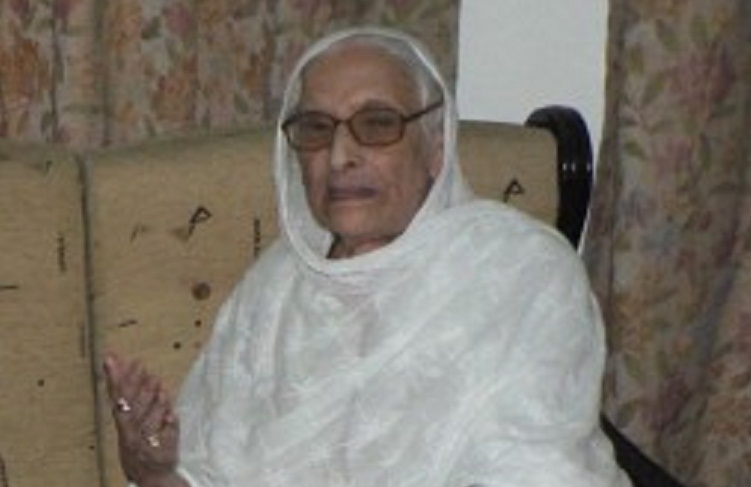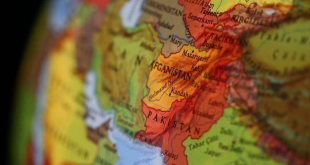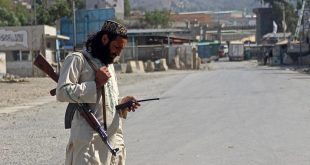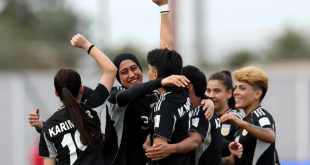By Aurang Zeb Khan Zalmay-Begam Nasim Wali Khan is the leader of Awami National Party (Wali) and wife of famous Pashtun politician late Abdul Wali Khan. Her husband was the first opposition leader in Pakistan and the founder of Awami National Party (ANP). Begam Nasim is the step mother of Asfandyar Wali Khan who is currently leading ANP and struggling for the political rights of Pashtuns against Punjabi elites. Begam Nasim is the former provincial president of ANP. She is also the first directly elected woman parliamentarian in the history of Pakistan in 1977 elections from Khyber Pakhtunkhwa. Among the Pashtuns she is respected as the mother of Pashtuns. Recently she is emerged with a new political party ANP (Wali). Aurang Zeb Khan Zalmay has conducted interview with her on Pashtun national politics and Durand Line.
In your recent interview to a Pakistani news channel, Waqt News, on 31st March 2015, with Fareeha Idrees, you said that neither you had ever before nor ever after recognized the Durand Line. You had said that quite openly. What do you mean by that?
Begam Nasim Wali Khan: Yes, as ever, even today I intensely refuse to recognize the temporary Durand Line, created by the colonial Brits for one hundred years. I don’t recognize it for the same reason as for example Germans would refuse to recognize a Berlin wall just because some foreign power had built it to divide Germans into an East and a West. If a division of the German nation couldn’t be acceptable to Germans, why a Pashtun division at the hand of the colonial power should be acceptable to Pashtuns? Accepting the Pashtun divide means to accept half of the cut off ourselves, which I don’t think in any way could be acceptable to anyone. Pashtuns are living on their historical land, and since people living on the either side of the colonial drawn Durand Line are Pashtuns, with one tongue, one culture, one blood, and one religious faith, there seems no reason for them to be divided or to accept any such division. Let us not forget that even for the Pakistani-nourished Taliban it was difficult to accept Durand Line, which they could never accept even when they ruled over Afghanistan.
As you say Durand Line is a temporary line, unacceptable because it splits up the Pashtuns, could you kindly tell how Pashtuns may be unified, divided as presently they are by Durand Line?
Begam Nasim Wali Khan: I think Pashtuns may get unified in the same natural way as Germans did.
You have accused Asfandyar Wali Khan to have sidelined the majority of the followers of Bacha Khan and Wali Khan, yet he claims that politically he is following in the footsteps of Bacha Khan and Wali Khan. How do you think he could still follow in the footsteps of Bacha Khan and Wali Khan while at the same time also sidelining their followers?
Begam Nasim Wali Khan: I don’t think I would feel the need to be active in politics in my 80s, had he followed in the footsteps of Bacha Khan and Wali Khan. I have come into conflict with him only because he has strayed off the political path of Bacha Khan to follow his own. The motto of the politics of Bacha Khan and Wali Khan was to serve the Pashtun nation, while the motto of the politics of Asfandyar and Haider Hoti is going about with corruption. In the previous general elections in 2013, we can see that people rebuffed ANP because of its past involvement in corruption at the time when the party was on the driving seat. I would also add that I didn’t leave my party but I was also sidelined by Asfandyar and was advised to stay at home rather to be active in politics. Even I made the party strong when I was heading and leading the party. And let me clear one thing, when I was the president of the party, at that time there was not a single allegation of corruption on our party.
In August 1947 when Pakistan came into being, why at that time neither Bacha Khan nor Wali Khan supported great Afghanistan, from Amu (River Oxus) to Abaseen (River Indus)? Moreover, on 2 to 4 September, 1947, there was a meeting of Khudai Khidmatgar in Serdaryab, where Pakistan rather than Great Afghanistan was supported. How the unification of Pashtuns could be materialized in that way?
Begam Nasim Wali Khan: Before 1947, we were annexed into British India. We, therefore, had to fight for our freedom against the British Colonial power in the then British India. Both Congress and Pashtuns of Khudai Khitmatgar worked together in the freedom movement, but we fought better than the Congress and we were tortured more than anyone else. When British were leaving South Asia, they didn’t give a choice to Pashtuns to make a decision for their own fate. Moreover, our existing assembly in Peshawar was bypassed by the British. But even then we didn’t find much support from Congress, which is why after the 3rd June Plan Bacha Khan had to say to Gandhi that they had thrown Pashtuns to the wolves. It was not merely Bacha Khan, but many others too, who could see at that time that the project of Pakistan contained too many holes to sail for long, and they were right when the whim of such a preposterous project as of unifying East and West Pakistan soon after came upon a horrible wreck. Bacha Khan had openly opposed the partition of India and he said that the partition of India was actually the partition of the Indian Muslims. After the Indian partition we found ourselves incorporated into Pakistan against our own wish, and it was now in Pakistan that we had to resume our political struggle, somehow different than the pre-partitioned time would have demanded, as new changes and challenges had by then surfaced.
Was Qarardad-e-Bannu (Bannu Resolution 1948) really for the separate state of Pashtunistan? Because this resolution is also called as Pashtunistan Resolution? And people in Pakistan think that this resolution was a hallmark and moreover inception of the Pashtunistan Movement?
Begam Nasim Wali Khan: No, Qarardad-e-Bannu was not a demand for a separate state of Pashtunistan. It was basically a demand that our elected assembly in Peshawar should be given the right to make an independent decision whether it wanted to vote for India, Pakistan or an independent status. And this was a legal demand as all other provincial assemblies were give this particular right except the then NWFP assembly, where we had the majority of two-thirds. My father himself was presiding this meeting in Bannu, and later Bacha Khan also went to Karachi and took the oath of allegiance with Pakistan, but so far Pakistan stigmatizes him as a traitor.
Red-Shirts Boycotted Referendum in NWFP, do you think it was a wise decision?
Begam Nasim Wali Khan: Yes, we boycotted the referendum, because it was a bogus referendum and an injustice with our province. Why they did not practice the same method of referendum in Panjab and Sindh? Referendum in Pakistan is mere a joke. Not only this referendum but all the subsequent referendums in Pakistan that sought to legalize military dictators were also ludicrous, held only for fun and amusement. Those who made struggle and suffered in the freedom movement were put behind bars in Pakistan while those who migrated from India took the reins of the government in their hands and turned the state in a wrong direction. They were not elected but they were imposed upon us. Mr. Jinnah and Liaqat Ali Khan did not have electoral constituencies in Pakistan.
In 1948 Bacha Khan took the oath in the constitutional assembly for the solidarity of Pakistan, but then Bacha Khan and Wali Khan were arrested; on 12 August 1948 the Babara massacre occurred, but even then they had always been supporting Pakistan. Why? What do you think Pakistan gave to the Pashtuns?
Begam Nasim Wali Khan: What is our fight? Our fight is for the rights of Pashtuns. We have a long history while struggling for the rights of Pashtuns. We are always sitting in the opposition while Punjab is always ruling this country. This makes us believe that here in this country, Pakistan is Punjab and vice versa. It seems as if Pakistan is the ‘Baly Baly’ of Punjab. If you see the natural resources, they are in Pashtun land but the authority to control these resources is with Punjab and not with Pashtuns. The smaller provinces in Pakistan seem to be the colonies of Punjab. Electricity, gas and oil are produced in Pashtunland, but Pashtuns have no right of authority over them. Our sole struggle is for the rights of our province, but we are not treated the way politicians are treated in Punjab, and instead to admire our struggle for our people it is always disapproved by Punjabi ruling elites.
Barrister Bacha once said in an interview with Voice of America that just after Pakistan came into being, the central government informed the provincial government of NWFP that if these Pashtuns were not compelled to forget their language, culture and history, they could never be the real Pakistanis. Bacha Khan has also said that any nation that forgets its language, culture and history disappears from the surface of the earth. But when in NWFP and Balochistan NAP came into power, Wali Khan was asked by Bhutto to decide whether he wanted Urdu language or Pashto for NWFP. Wali Khan decided URDU. Does this mean that Wali Khan adopted the policy of Pakistan and ignored the philosophy of Bacha Khan?
Begam Nasim Wali Khan: Wali Khan was a cogitative politician; he judged things in advance and reached to the conclusion before making any decision. At that time Pashto writings were not common and not understandable to most of the Pashtuns. He thought that first Pashtuns need to understand Pashto script and rules. Also at that time we did not have textbooks in Pashto and there was not an official usage of Pashto in the offices of our province. I however say that on the other side Urdu is not even a national language; it is an alien language imposed upon us.
I endorse that Bacha Khan’s statement is right, because if a nation forgets its language, culture and history, then such a nation disappears from the surface of the earth. I can tell you, when the first time I went to the provincial assembly as an elected member I urged on the Pashto language to be the part of our school texts so that our kids could understand and read their mother tongue too.
General Zia ul Haq created difference between the Pashtun and Baloch in the NAP, but it is sometimes said that Zia used Wali Khan for creating such differences. What do you think about it?
Begam Nasim Wali Khan: Wali Khan never supported or made connection with any of the military dictators. Once when we were in a hospital in Rawalpindi, Gen. Zia offered him the presidency of Pakistan, but he refused it. He advised Gen. Zia to fulfill the vow he had made to the public about general elections and the return of the military to their barracks. Such a straight forward response from Wali Khan made Gen. Zia disappointed, and he turned to look for other options, finally discovering Muhammad Khan Junejo. The rest is history.
All the parties starting from Khudai Khidmatgar to National Awami Party (NAP) and then Awami Natinal Party (ANP) say that their philosophy has always been non-violence, but people are saying that when Ajmal Khan Khattak and Azam Khan Hoti were in Kabul, they were organizing bombs blasts, which means they were involved in terrorism not in Pakistan but among the Pukhtuns only, killing a lot of innocent people. If this was true then where was your non-violence policy at that time?
Begam Nasim Wali Khan: No, this is not true. Terrorism needs lots of money, proper space, training centers and a favorable environment such as we see today in Pakistan. In Pakistan, some called the ISI trained terrorists ‘their own sons’ and used them unlike people use their own sons. As a result Pakistan received lots of money. But as far as Ajmal Khattak and my brother are concerned, they are totally innocent in this case.
Ajmal Khattak was a poor man (Faqeer) with high moral characters. He loved not only Pashtun but all human beings. My brother Azam Hoti and Ajmal Khattak rushed to Kabul after a large demonstration was attacked in Rawalpindi Liaqat Bagh in 1973 by the Federal Security Force under the order of PM Bhutto. Dozens of innocent Pashtuns (workers of NAP) were being killed. Even then Pashtuns were nonviolent. I can tell you Ajmal Khattak and his companions were not even allowed to go outside the refugee camp in Jalalabad. I remember that Baloch, especially Marri and Mengal tribes, at the other hand responded violently to the state of Pakistan at the time when Attaullah Khan’s son was kidnapped. But Pashtuns remained nonviolent at all levels.
Your father-in-law, Bacha Khan, was a closed friend, great admirer and staunch ally of Mr. Gandhi in the freedom movement of India. He once said – and probably his last words to Mr. Gandi – that Pashtuns have been thrown to the wolves. Does this mean that Bacha Khan had failed in his struggle and became the victim of deception at the hand of Mr. Gandhi and his erstwhile allies in the Congress party?
Begam Nasim Wali Khan: I usually say to people that Bacha Khan Baba had not failed in his struggle; rather he was successful in his mission. His mission was to get freedom from the Colonial Brits, and he was quite successful in that. Yes, he said this ‘thrown to the wolves’ either to Mr. Gandhi or Jawaher Lal Nehru. After the 3rd June Plan, he felt himself alone and betrayed at the hand of Congress. Of course, after the partition, Pashtuns found themselves in far horrible situation than they had ever seen under the British rule; Bacha Khan too faced more severe situations in Pakistan, and he and his companions were thrown into prisons in Pakistan and were tortured worse than ever before in the British era, yet the achievements of Bacha Khan are too many for a single person in one life-period.
Why Bacha Khan had extended close ties with Delhi and not with Kabul?
Begam Nasim Wali Khan: If you see the facts then you will know that Afghanistan was more near to Bacha Khan rather than India and Pakistan. He spent his exile there in Afghanistan and his last wish was to be buried there in Afghanistan.
You know the atrocities of Pakistan upon Bengalis, Balochs and Pashtuns. And we can see that in 1971 Bengalis got freedom from Pakistan, why Pashtuns being having the leadership of Wali Khan did not react like Bengalis at that time?
Begam Nasim Wali Khan: Bengalis faced a lot of troubles because of Pakistan even though Bengalis were in majority; they were 54% and we were 46% here in West Pakistan. But they were backed by India and therefore they were successful in getting independence from Pakistan. But on the other side Pashtuns have nobody on their back. Bacha Khan also said once to someone in a comic way that Bengalis had a manly woman on their back but we have nobody. So it was India who fought for Bengalis against Pakistan. Also the surrender of 90 thousand Pakistani soldiers was the most shameful event in the history. However, Wali Khan played a role of mediator, but Z. A. Bhutto ultimately declared ‘there you, here we’ and disintegrated the country.
The genocide of Pashtuns and Baloch is in full swing in Pakistan, however Baloch are struggling for their independence. Do you think the Pashtuns should also struggle for their independence from Pakistan?
Begam Nasim Wali Khan: Pashtuns! I don’t think Pashtuns of today will ever get independence from Pakistan. Those who had such spirit are dead and no more alive. I don’t see potential in today’s Pashtuns that they will ever raise for independence.
Can you kindly tell us as to why Bacha Khan joined Congress and not Muslim League?
Begam Nasim Wali Khan: Actually Bacha Khan was a social reformer more than a politician. His aim was to serve human beings without any personal interest. To work more on a large scale, Bacha Khan and his companions first approached Muslim League for joining their platform, but they refused, as Muslim League was pro-British while Bacha Khan’s activities were against the British colonial powers in India. So later they were informed about congress party in India and ultimately they made an approach to join Congress.
Why Ghani Khan, the great Pashto poet of 20th century and the eldest son of Bacha Khan, did not work together in the field of politics with his father Bacha Khan and his brother Wali Khan and parted ways with them after the creation of Pakistan in 1947?
Begam Nasim Wali Khan: Ghani Khan was very near to me. Once he told me, “I like you but I dislike your father.” Look he was a poet and poets live in some other world. He was always living in the world of imagination. What I think is that his mind was not political; however, his writings provide the Pashtuns an enough outlook of politics. He was a world in himself.
Now you have formed a new party ‘ANP Wali’. Why you felt the need for it? It is also said that establishment is behind the formation of ANP Wali?
Begam Nasim Wali Khan: Sadly speaking, we were compelled to form a separate party even if many Pashtun political leaders had an objection on that. It was also the idea of Khan Lala, as he motivated me to start again active politics, because ANP had lost its due position in the last general elections in 2013. My demand which I made in the press conference was that all those candidates who lost their elections should resign, but I was not heard among them. And more than half of party workers were unhappy with attitude of the party. So unwillingly we have formed this party ‘ANP Wali’. And I don’t understand why people are thinking that our party ANP Wali has some support from the establishment. Plainly speaking, I do not even know the name of the chief secretary of our province, because I do not have any concern with him. I do not need anything from the establishment.
For Pashtuns, this war goes back more than 35 years. Are they deliberately indulged in it?
Begam Nasim Wali Khan: The war on terror is not imposed upon us but unfortunately we have imposed it upon ourselves. The tragedy of this war is that on both sides of the Durand Line Pashtuns are being killed.
Do you think the Afghans living here in Peshawar are the Muhajirs (Refugees), or that they are living on their own historical land?
Begam Nasim Wali Khan: To answer this question, I will tell you a story. Once a guest came here and met Wali Khan. He told Wali Khan that he was a Muhajar (Afghan Refugee)… Wali Khan pushed him away and told him, “Are you not feeling shame while calling yourself a Muhajir on your own soil?”
Is this not a good answer or what more I can tell you?
Being a security state, what do you think about the future of Pakistan?
Begam Nasim Wali Khan: I am always thinking about the ongoing situations and their solution in the region. The solution lies in nonviolence and in the neutrality of the regional states. One state should not interfere in the affairs of other states. The soil of one state should not be used against the others. Through this way we can bring peace to the region. And this is my wish to see peace in the region before my death.
The tragedy is that our foreign policy is not formulated free and independent. I am also not in the favor of military courts. The introduction of military courts in Pakistan means that the judiciary is not making the due performance and its role is dubious.
But on the other side when I see the face of the army chief Gen. Raheel Sharif, then I see some truth in his face. I believe his determination and his action against terrorism are based on honesty. But the former generals were involved in providing safe havens to the terrorists. The terrorists from Swat and Bajaur were provided patronage in North-Waziristan by the former military generals. But I think Gen. Raheel is sincere to eradicate terrorism.
Mujahid Hussain is a Punjab writer, who has written a popular book ‘Punjabi Taliban’. In this book he says that major terrorists and extremist organizations have their sanctuaries and training camps in Punjab and especially in Lahore. And we also can see that many high profile terrorists especially from Alqaeeda were either killed or arrested in Punjab. Mostly internationally wanted terrorists, especially wanted to India, are still running their training camps in Punjab at large. But Pakistan army has launched operations in Pashtun’s belt only. What do you say about that?
Begam Nasim Wali Khan: We cannot give advices to the military because they are usually easily offended, as they consider themselves the protectors and sole patriots of the country. But they should think as to how and where to target the terrorists. They should target the training camps and sanctuaries of the terrorists rather than to target them individually. Karachi is also a hub of terrorists but the military reaction in Karachi is quite different than their operations in Waziristan.
It is also said that Pakistan is the bastion of all terrorists and these terrorists are considered the strategic assets and the shadow army of Pakistan. What do you think?
Begam Nasim Wali Khan: I can feel not comfortable to tell you the truth about the game going on our soil, but I have to tell you that ISI is involved in this game, because if you see General (Rtd) Naseerullah Babar openly called Taliban as his sons. Gen. Yousaf in his book wrote all about how they trained Taliban. Taliban are actually religious students and they did not know how to use Kalashnikovs and tanks. They had to be trained for that. To do so, ISI played its role quite enthusiastically. Pakistan is involved in the destruction of Afghanistan since 1973. And the terrorism and bomb blasts what we see in Pakistan is the reaction of our policies. After 9/11, when bomb blasts happened in Pakistan, Wali Khan said if you present someone flowers you will get flowers in return but if you throw fire in someone house you get the same response in reaction. And this we observe now in Pakistan.
What is your message to the Pashtun women?
Begam Nasim Wali Khan: Pashtun women should focus on educating their kids. That can bring a societal change if they educate their children. I can tell them that the war on our soil does not belong to men only, but also to Pashtun women. Every Pashtun woman is Malalai of Maiwand here.
What is your message for Malala Yousafzai?
Begam Nasim Wali Khan: My message for Malala Yousafzai is that she should come back. We are together with her in her mission and we will fight this war together with her.
What message would you give to the world regarding the genocide of Balochs and Pashtuns in Pakistan and what will be the ultimate result of this genocide?
Begam Nasim Wali Khan: I cannot predict but I can tell you one thing about the realities what I can see on the ground that many people and some powers want to distort the way of life of the Balochs and Pashtuns. And all those who are involved in the genocide of Balochs and Pashtun, they are their open enemies.—(The Pashtun Times)
 Afghanistan Times Latest News and Analysis from Afghanistan and the Region
Afghanistan Times Latest News and Analysis from Afghanistan and the Region




